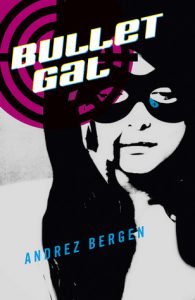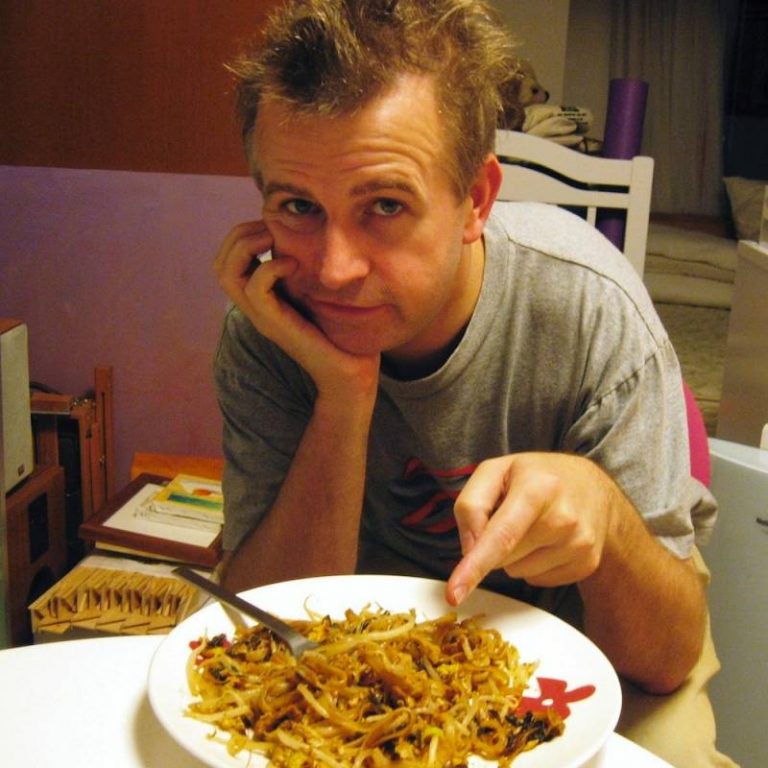Almost a month ago, we reviewed the novel adaptation of Andrez Bergen’s comic book, Bullet Gal. Now, he’s lend us a little bit of his time to answer a few questions about the development of said novel. And also what came before it.
Hello, Andrez! Thank you so much for providing Cultured Vultures with an interview. How are you?
Pretty darned good, thanks — and thank you. How about your own fine self?
Life has had a few ups and downs, but, overall, I’m doing fine. So, why did you decide to adapt Bullet Gal into a novel?
There’s a good question. I believe in many respects I felt the story was an unfinished one. The comic book series acted as a dry run, you could say, most of it composed ad lib — on the roll — while doing the art. I could see elements I wanted to expand upon or tweak well after I’d finished those twelve issues. And while I adore doing comics, I do see myself more as a novelist, so adapting it seemed natural.
And was it hard to convert the comic to a book format?
Depends how you look at it. Since I illustrated the original comic, which granted is not my ‘gift’ per se, sometimes that was a tough slog to match the words with pictures. But with a novel there is no visual component, meaning I have to get more effusive with the vocabulary. Painting out the situations and the locales can be a tiring exercise for someone who much prefers working with dialogue!
As a creator, do you think you favour a certain practise than the other? Does progress come easier to you through being a comic artist or a novelist?
As a comic writer first up, I love the process since I’m working with someone else — the artist — and they bring other ideas to bear that I may not have considered. It’s a real collaborative exercise that opens things up. When I illustrate my own words, I tend to slow down and mull over things — also great for the creative flow, since sometimes a wad of repartee bounces out of a particular visual. Yet writing a novel seriously is something I lose myself into. It’s a journey, one that leaves me a little lost once I finish, as I’m right into the characters and setting. So, to properly answer your question, I think I enjoy all these routes. They bounce off one another, making progress in more subliminal ways regarding the creative putsch.
 That said, what was the process in creating Bullet Gal‘s universe? Did the idea come to you right away or was it a slow development?
That said, what was the process in creating Bullet Gal‘s universe? Did the idea come to you right away or was it a slow development?
With Bullet Gal, I’d actually just finished writing the novel Depth Charging Ice Planet Goth — which is Mitzi’s origin tale, in an offbeat kind of fashion — as well adapting my first book Tobacco-Stained Mountain Goat into a graphic novel I wrote and illustrated. So I had novels and comics on the brain, and Mitzi was fresh and vibrant. I felt I wanted to further explore her character, after her arrival in Heropa, and create a kind of missing link between Depth Charging Ice Planet Goth and Who is Killing the Great Capes of Heropa?, which is a novel set four years later. So, I bit the bullet so to speak without much more thought at all, and created the first issue of Bullet Gal as a standalone mini-comic. The process got addictive from there, meaning I churned out eleven more issues in just a few months. Her universe — specifically the city of Heropa — has been percolating since 2013, when we published Who is Killing the Great Capes of Heropa?, but it also relates to the near-future dystopia Melbourne has become in Tobacco-Stained Mountain Goat. So I guess it’s a world that’s been on the boil for five years now.
What kind of character do you think you would be in Bullet Gal? Just a normal “phony”, a heroic “cape”, a corrupt “bop”?
Ha Ha Ha Ha… what a wild question! I’d have to go with a heroic Cape; I owe that to a childhood growing up with and loving the superhero trope. There’s a lot of me in Jack (Southern Cross) from Who is Killing the Great Capes of Heropa?, particularly the childhood Andrez. But I adore the alcoholic swashbuckling antics of Milkcrate Man as well. I’d love to have Mitzi’s swagger, but I’m just not there.
Did you always plan to create a prequel to Who is Killing the Great Capes of Heropa?
No! Funnily enough I’ve always nutted over a sequel, but I just don’t know where to take it from there. I like the ambiguity of the ending. But what Mitzi says there, that she remembers everything, made me wonder: what’s the ‘everything’ she’s referring to? Interestingly, I’m now working on a kind of sequel, a comic series called Crash Soirée with Graeme Jackson. It’s set in Heropa about nine years after the events in Bullet Gal. And a bunch of other comics I’m doing — Magpie and The Fenders — is set round the same timeframe.
Now, Brigit and Mitzi. I loved these two badass ladies while reading Bullet Gal, but I wished there was a more direct confrontation between the two in the novel. Do you ever plan coming back to that connection?
Thanks, Carol. Both mean a lot to me too — and while Mitzi’s my hero, Brigit was just plain fun to write, you know? In the comic, in the final issue, they do actually meet in kind of bizarre circumstances, but in the novel that thread didn’t work so I skipped it. I think the build-up between these two women, and the notion that they’re diametrically opposed forces, works nicely. A confrontation would have capped that well, but in some ways seemed — I don’t know, unnecessary? It’s almost a tragedy now instead that a vibrant personality like Brigit’s is — well. You know.
Do you think there’s something missing in the mainstream comic industry? Also, what kind of comic books do you like to read in your spare time? (Manga also counts.)
I don’t know if there’s anything missing, since there’s such depth and breadth in the modern world of comics, from indies right through to majors. But I find myself drifting to a lot of older comics for the simplicity and innocence. I mean, I cherish the depth of the contemporary global comic book scene, and the fact that wildly talented writers like Alan Moore, Matt Fraction and Ed Brubaker over the years have inserted such psychology and grit and humour — but too much of that and it gets oppressive. So, yeah, I do read new stuff — most of it from Image Comics or indies — as well as older runs. And I love my manga, too, again mostly classics from creators like Kazuo Umezu, Katsuhiro Otomo, Mitsuru Adachi.
Okay, now for the hardest question of them all: DC or Marvel?
Hmm. You know, as a kid, I would’ve cited both. I grew up with 1960s/’70s Marvel like Fantastic Four, Avengers, Iron Man, Ant-Man, Thor and Captain America, as well as reprints of 1950s-70s DC Batman, The Flash, Sgt. Rock, Enemy Ace, even Superman. But I also was sucking in British comics and Australian reprints of The Phantom. As a teen I discovered manga and local indie comics. Over the years since, I did drift more into the Marvel camp, although I gave up on both majors completely in my twenties. I guess the most recent (writing) runs I’ve enjoyed have been at Marvel — Matt Fraction on Hawkeye, and Ed Brubaker on Captain America and Daredevil — but I also dug Jeph Loeb’s work with Batman. Right now, however, it’s a cursory interest. I much prefer what Image Comics is doing.
Some of the coverage you find on Cultured Vultures contains affiliate links, which provide us with small commissions based on purchases made from visiting our site.

